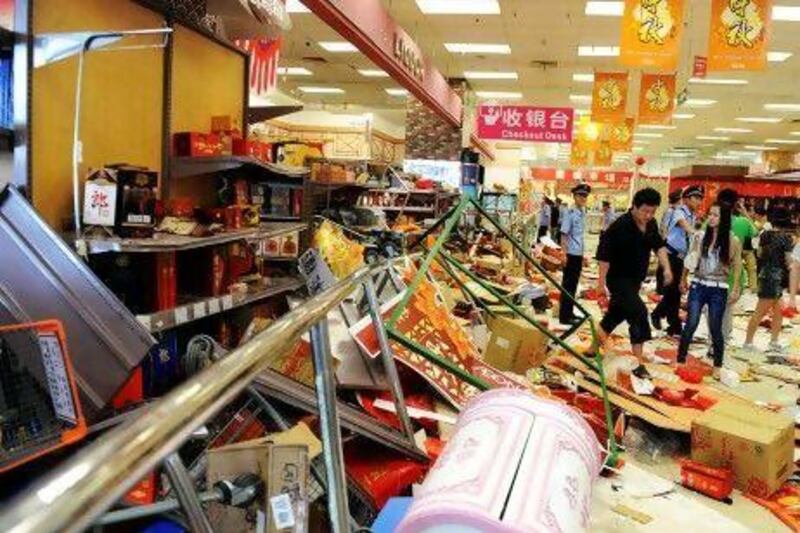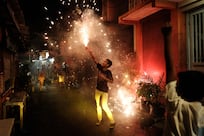BEIJING // Thousands took part in anti-Japanese protests in the Chinese capital yesterday, as tensions continued to run high in a dispute over islands in the East China Sea claimed by Japan and China.
Reports yesterday described the latest round of demonstrations - which have seen Japanese businesses attacked, factories closed and tour-group visits to Japan cancelled - as the most serious wave of anti-Japanese sentiment in China for decades.
Some Japanese families living in the country are said to be afraid to leave their homes.
The Japanese-controlled islands are uninhabited but located within a resource-rich maritime area.
The recent tensions have been sparked by a Japanese government decision to buy the islands, known as Senkaku in Japan and Diaoyu in China, from the Kurihara family, who are Japanese.
The move aimed to stop a more provocative plan by the nationalistic Tokyo governor, Shintaro Ishihara, to purchase and develop the islands.
In recent days in China, Toyota and Honda car dealerships have been set alight and a Panasonic factory was damaged by workers. It remains closed.
Canon and Honda have also closed certain factories, while a number of Japanese retail outlets have stopped trading.
Throughout the day yesterday in Beijing, protesters marched in groups past the Japanese Embassy, shouting slogans and hurling water bottles over the heads of the riot police standing guard.
Among those taking part was Xia, 20, who brandished a sign that said: "Boycott Japanese goods. Don't forget our history. We should claim the islands back."
"I want to do something for China, to show the islands belong to China," said the graphic designer, who wore a red bandanna around his head. "These islands are an inseparable part of China, like a child to its mother. Every Chinese person is angry."
While attracting thousands yesterday, the Beijing protests were tightly controlled, with officials closing off roads and letting protesters march only in orderly groups of several dozen.
According to Barry Sautman, an associate professor and political analyst at Hong Kong University of Science and Technology, China's model of controlling large-scale demonstrations against foreign countries dates back to the 1999 protests against the United States bombing of the Chinese Embassy in Belgrade.
Since then, he said, the authorities have limited protests by only allowing people to march in small groups, then sending them away.
"It's an unusual pattern of crowd control but it seems to have prevented greater violence," he said.
One banner yesterday featured the Japanese flag superimposed on a pig, saying: "Pathetic Japanese pigs, get out of Diaoyu islands, or tomorrow you will appear on Chinese people's dining table."
Zhang, 40, an electrical engineer who joined in the protests, said there was historical evidence that the islands belonged to China and "Japan is lying".
"They deny crimes they have carried out against China before," he added. "This is really disturbing. The Diaoyu islands belong to China and we should take them back."
When it comes to issues such as the disputed islands, the domestic media are given little leeway in their reporting, said Doug Young, a journalism professor at Shanghai's Fudan University and the author of a forthcoming book, The Party Line, about the Chinese media.
"Everybody in the domestic media has to use the Xinhua [official news agency] report, which gives the central government a tool to shape national opinion. They do that very effectively," he said.
While not against people feeling angry over the island, the authorities appear keen "to keep a lid on how much anti-Japanese [sentiment] gets whipped up".
"They're really sensitive about social disorder," said Mr Young. "They want to keep a certain level of pressure on Japan by whipping up the masses but they want to be careful not to allow that to get out [of hand]."
In a 2010 Stockholm Peace Research Institute report, the authors Linda Jakobson and Dean Knox noted that the Chinese authorities sometimes use nationalistic sentiment "on select international issues to further the government's interests".
The report states that nationalism was "a dangerous tool" that could turn against the authorities.
"Nationalistic groups can also direct their emotions at the government, criticising it for being too weak and demanding that it stands up to other governments," it says.
Mr Sautman said on issues such as the disputed islands, the state's main role was "not to whip up this sentiment but to contain it".
This is particularly the case, he said, because protests about international disputes sometimes lead to complaints over domestic issues.
"The Chinese authorities are always concerned those involved in protests concerning matters that infringe upon territorial integrity may raise other questions," he said.
Follow
The National
on
[ @TheNationalUAE ]
& Daniel Bardsley on
[ @DanielBardsley1 ]






